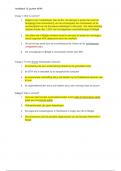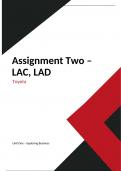Week 1:
No cases
Week 2:
Malaysian Historical Salvors, v Malaysia, ICSID case: Tokios Tokeles v. Ukraine, ICSID
case: his corporate veil is only illegitimate when it is intended to abuse law, so called
‘piercing the veil’. Tribunals will generally only do this in the case of fraud or illegal
activities, which is also shown in the ICSID case Tokios Tokeles v. Ukraine, where the
tribunal allowed for a corporate veil even though 99% of the company was controlled by
nationals of the Contracting State party to the dispute.
Week 3:
Barcelona Traction, Light and Power company (Belgium v Spain): concerned the issue of
piercing the corporate veil for purpose of diplomatic protection of shareholders. Is an indirect
investment actually protected? The government of Belgium (company was Canadian, but
88% owned by Belgian companies) brought a claim on behalf of its nationals. The ICJ
provided that “an act infringing only the company’s rights did not involve responsibility
towards the shareholders, even if their interests were affected”.
ICJ made a distinction between the rights of shareholders and the rights of the company.
Rights of shareholders were right to dividend, voting rights, attendance rights, appointment
rights, and whatever else national law provides. Shareholders however do not have a right
with regards to company owned assets. In this case the ICJ decided that only the rights of the
company were affected in the bankruptcy decision, and not the rights of the shareholders Thus
Belgium did not have standing (keep in mind, this is inter-state dispute at ICJ, not ICSID) and
Canada should have been the State to sue Spain. This was decided on the basis of customary
international law. Could however be relevant, for instance if there is a case where a major
shareholder wants to sue the Contracting State party to the dispute, but cannot because the
breach of contract does not affect shareholders rights. However, since this concerns a case
outside of the ICJ, and you are the Contracting State and thus wishes this would apply before
the ICSID, you would need to bring custom into the BIT. For instance, because the fact
pattern is the same, the ICJ has interpretive authority, customary international law is binding
upon all states and always, unless clearly decided otherwise. General rules of interpretation of
art 31 VCLT would also help with this, since in the interpretation of a treaty, we need not only
to look at the treaty at hand, but also at the other rules applicable in relation to the two
Contracting States. However, this case is not a good precedent for investment disputes, see
CMS & Gas Transmission v Argentina Case.
CMS Gas Transmission Co v. Argentina, ICSID case: (also, see second paragraph of
Barcelona Traction Case, ICJ) Doctrine of indirect investment: the ones that are
economically harmed by decisions taken against a company are its shareholders and thus the
shareholders can bring a claim against a State See Barcelona Traction, the ICJ had already
stated that despite its decision there, the case could be different when it was an investment
dispute, and not a diplomatic dispute like the BT case was.. In order to put an end to its
economic crisis of the late 1980s, Argentina adopted an economic recovery plan that included
a program to privatize certain government owned industries and public utilities + it enacted
various new laws. CMS (US company, Gas transmission) commenced arbitration proceedings
against Argentina at ICSID under the US - Argentina BIT, regarding actions taken in 2000
,(further economic crisis in Argentina) to defer the application of the US PPI to gas industry
tariffs, Argentina’s Emergency Law and other measures adopted during the crisis. CMS
claimed violations of the BIT with respect to expropriation and FET. The Tribunal rejected
the claim’s on expropriation, but rules that Argentina had breached its obligations on fair and
equitable treatment and the umbrella clause (by violating stabilization clauses in a license.
Tribunal rejected necessity and emergency defences relating to the severe economic, social
and political crisis.
Decision important in a number of respects: First, it confirmed that, where a treaty’s
definition of investment includes equity, stock or shares in a company, a minority shareholder
has a direct right of action against the host state that can be asserted independently from the
rights of the company itself. Second, it held that an umbrella clause that requires a host state
to observe “any obligations it may have entered into with regard to investments” is concerned
with consensual obligations not entered into erga omnes, but with regard to particular persons.
It held that the effect of an umbrella clause is not to transform the relied-upon obligation into
something else; the content of the obligation is unaffected and likewise the parties to the
obligations are not changed (p.299-303). Third, it held that a host state is not required to
satisfy the requirements of the customary law defence of necessity, codified in article 25 of
Articles on State Responsibility, in order to rely on a defence of necessity contained in the
treaty (if there is one). Fourth, the decision has produced one of the most extensive
interpretations of the FET obligation, extending host states’ obligations under the clause well
beyond the level of customary law. Fifth, it has confirmed that the powers of annulment in an
ICSID arbitration are limited to those set out in article 52 of the ICSID convention. In
particular, an annulment committee is not an appeal mechanism and it has no power to correct
manifest errors of law, even where it recognizes these.
Jurisdiction: the BIT defined “investment” broadly to include “every type of investment in the
territory of one party owned or controlled directly or indirectly by nationals or companies of
the other party” and included “a company or shares of stocks or other interests in a party”.
Did not require the shareholder to own a majority of the stock or control the company (point
1, p. 68-76 Annulment decision).
So, all sorts of corporate structures are possible and there could possibly be parallel
proceedings, but they obviously need to be avoided.
Emilio Agustin Maffezini v. Kingdom of Spain, ICSID case: The claimant was an
Argentinian individual who established and invested in a corporation named EAMSA, for the
purpose of building a production facility for chemical products in Galicia, Spain. The project
was a joint venture with the Sociedad para el Desarrollo Industrial de Galicia(SODIGA), a
public-private entity with a mandate to encourage industrial development in Galicia.
SODIGA provided the investor with assistance in the form of advice and financing.
The project eventually failed due to surging costs, and the investor filed for arbitration under
the Argentina-Spain BIT. The investor claimed (1) that the project failed because SODIGA
had given flawed advice underestimating the costs of the project, and (2) that SODIGA was
responsible for the additional costs resulting from the Environmental Impact Assessment
(EIA) because it had pressured EAMSA to begin construction before the EIA process was
finalized. Spain contested the allegations, stating that SODIGA was a private company whose
acts were not attributable to the state, and that the investor had assumed any risk relating to
the feasibility and profitability of his investment.
On the issue of state attribution, the tribunal found that some of SODIGA’s functions were
governmental in nature while others were commercial. Accordingly, the tribunal found that it
, was necessary to categorize the various acts or omissions giving rise to the dispute. On the
investor’s main claim – that SODIGA’s bad advice was responsible for the project’s failure –
the tribunal found that even though SODIGA officials had provided certain assistance relating
to the project’s costs and returns, that assistance did not amount to a public function
attributable to the state. Moreover, the investor was, simply put, responsible for his own
investment. The tribunal explained:
“Bilateral Investment Treaties are not insurance policies against bad business judgments.
While it is probably true that there were shortcomings in the policies and practices that
SODIGA and its sister entities pursued in the here relevant period in Spain, they cannot be
deemed to relieve investors of the business risks inherent in any investment.”
The claimant also contended that SODIGA was responsible for the additional costs resulting
from the EIA, which lead to the investor’s decision to stop the construction work and call off
the project. In this regard, the tribunal concluded that the investor should have known that the
project – a chemical plant – would require an EIA. According to the tribunal, the investor had
known about the EIA requirement from the beginning of the project, but had tried to
minimize it so as to avoid additional costs or technical difficulties.
For these reasons, the tribunal found that Spain could not be held responsible for the
investor’s losses.
Plama Consortium Ltd v. Bulgaria, ICSID case: Plama Consortium Limited (PCL), a
Cyprus firm, was not entitled to protections afforded under the Energy Charter Treaty (ECT),
given that it had fraudulently misrepresented itself when it invested in a privatized refinery,
Nova Plama AD. In addition, the Tribunal found that even if PCL were entitled to certain ECT
protections, the Republic of Bulgaria did not breach its treaty obligations. As a result, PCL
was ordered to pay all the fees and expenses of the Tribunal and ICSID’s administrative
charges, as well as USD$ 7 million in legal fees and other costs incurred by Bulgaria.
PCL had sought some USD$ 122 million in damages plus interest for alleged breaches of
obligations under the ECT and Cyprus-Bulgaria bilateral investment treaty, after Nova Plama
AD had its assets liquidated to meet creditors’ claims. Specifically, PCL argued that Bulgaria
(i) failed to create stable, equitable, favorable and transparent conditions for the investment,
(ii) failed to provide the investment with fair and equitable treatment, (iii) failed to provide
the investment constant protection and security, (iv) subjected the investment to unreasonable
and discriminatory measures, (v) breached its contractual obligations vis-à-vis PCL, and (vi)
subjected the investment to measures having an effect equivalent to expropriation.
In defense, Bulgaria raised objections to the Tribunal’s jurisdiction over the admissibility of
PCL’s claims by arguing that the company’s investment in Nova Plama AD involved
misrepresentations in violation of Bulgarian law. As a result, Bulgaria asserted that the
investment was void ab initio (from the beginning) under Bulgarian law and, therefore, not an
“investment” as contemplated by the ECT.
While the Tribunal found that Bulgaria’s allegations of misrepresentation did not deprive it of
jurisdiction to hear this case, they did bar PCL from seek protection under the ECT given that
its investment in Nova Plama AD was obtained by fraud. The Tribunal concluded that “[t]he
investment in Nova Plama was . . . the result of a deliberate concealment amounting to fraud,
calculated to induce the Bulgarian authorities to authorize the transfer of shares to an entity
that did not have the financial and managerial capacities . . .” required to continue with its
operations.
No cases
Week 2:
Malaysian Historical Salvors, v Malaysia, ICSID case: Tokios Tokeles v. Ukraine, ICSID
case: his corporate veil is only illegitimate when it is intended to abuse law, so called
‘piercing the veil’. Tribunals will generally only do this in the case of fraud or illegal
activities, which is also shown in the ICSID case Tokios Tokeles v. Ukraine, where the
tribunal allowed for a corporate veil even though 99% of the company was controlled by
nationals of the Contracting State party to the dispute.
Week 3:
Barcelona Traction, Light and Power company (Belgium v Spain): concerned the issue of
piercing the corporate veil for purpose of diplomatic protection of shareholders. Is an indirect
investment actually protected? The government of Belgium (company was Canadian, but
88% owned by Belgian companies) brought a claim on behalf of its nationals. The ICJ
provided that “an act infringing only the company’s rights did not involve responsibility
towards the shareholders, even if their interests were affected”.
ICJ made a distinction between the rights of shareholders and the rights of the company.
Rights of shareholders were right to dividend, voting rights, attendance rights, appointment
rights, and whatever else national law provides. Shareholders however do not have a right
with regards to company owned assets. In this case the ICJ decided that only the rights of the
company were affected in the bankruptcy decision, and not the rights of the shareholders Thus
Belgium did not have standing (keep in mind, this is inter-state dispute at ICJ, not ICSID) and
Canada should have been the State to sue Spain. This was decided on the basis of customary
international law. Could however be relevant, for instance if there is a case where a major
shareholder wants to sue the Contracting State party to the dispute, but cannot because the
breach of contract does not affect shareholders rights. However, since this concerns a case
outside of the ICJ, and you are the Contracting State and thus wishes this would apply before
the ICSID, you would need to bring custom into the BIT. For instance, because the fact
pattern is the same, the ICJ has interpretive authority, customary international law is binding
upon all states and always, unless clearly decided otherwise. General rules of interpretation of
art 31 VCLT would also help with this, since in the interpretation of a treaty, we need not only
to look at the treaty at hand, but also at the other rules applicable in relation to the two
Contracting States. However, this case is not a good precedent for investment disputes, see
CMS & Gas Transmission v Argentina Case.
CMS Gas Transmission Co v. Argentina, ICSID case: (also, see second paragraph of
Barcelona Traction Case, ICJ) Doctrine of indirect investment: the ones that are
economically harmed by decisions taken against a company are its shareholders and thus the
shareholders can bring a claim against a State See Barcelona Traction, the ICJ had already
stated that despite its decision there, the case could be different when it was an investment
dispute, and not a diplomatic dispute like the BT case was.. In order to put an end to its
economic crisis of the late 1980s, Argentina adopted an economic recovery plan that included
a program to privatize certain government owned industries and public utilities + it enacted
various new laws. CMS (US company, Gas transmission) commenced arbitration proceedings
against Argentina at ICSID under the US - Argentina BIT, regarding actions taken in 2000
,(further economic crisis in Argentina) to defer the application of the US PPI to gas industry
tariffs, Argentina’s Emergency Law and other measures adopted during the crisis. CMS
claimed violations of the BIT with respect to expropriation and FET. The Tribunal rejected
the claim’s on expropriation, but rules that Argentina had breached its obligations on fair and
equitable treatment and the umbrella clause (by violating stabilization clauses in a license.
Tribunal rejected necessity and emergency defences relating to the severe economic, social
and political crisis.
Decision important in a number of respects: First, it confirmed that, where a treaty’s
definition of investment includes equity, stock or shares in a company, a minority shareholder
has a direct right of action against the host state that can be asserted independently from the
rights of the company itself. Second, it held that an umbrella clause that requires a host state
to observe “any obligations it may have entered into with regard to investments” is concerned
with consensual obligations not entered into erga omnes, but with regard to particular persons.
It held that the effect of an umbrella clause is not to transform the relied-upon obligation into
something else; the content of the obligation is unaffected and likewise the parties to the
obligations are not changed (p.299-303). Third, it held that a host state is not required to
satisfy the requirements of the customary law defence of necessity, codified in article 25 of
Articles on State Responsibility, in order to rely on a defence of necessity contained in the
treaty (if there is one). Fourth, the decision has produced one of the most extensive
interpretations of the FET obligation, extending host states’ obligations under the clause well
beyond the level of customary law. Fifth, it has confirmed that the powers of annulment in an
ICSID arbitration are limited to those set out in article 52 of the ICSID convention. In
particular, an annulment committee is not an appeal mechanism and it has no power to correct
manifest errors of law, even where it recognizes these.
Jurisdiction: the BIT defined “investment” broadly to include “every type of investment in the
territory of one party owned or controlled directly or indirectly by nationals or companies of
the other party” and included “a company or shares of stocks or other interests in a party”.
Did not require the shareholder to own a majority of the stock or control the company (point
1, p. 68-76 Annulment decision).
So, all sorts of corporate structures are possible and there could possibly be parallel
proceedings, but they obviously need to be avoided.
Emilio Agustin Maffezini v. Kingdom of Spain, ICSID case: The claimant was an
Argentinian individual who established and invested in a corporation named EAMSA, for the
purpose of building a production facility for chemical products in Galicia, Spain. The project
was a joint venture with the Sociedad para el Desarrollo Industrial de Galicia(SODIGA), a
public-private entity with a mandate to encourage industrial development in Galicia.
SODIGA provided the investor with assistance in the form of advice and financing.
The project eventually failed due to surging costs, and the investor filed for arbitration under
the Argentina-Spain BIT. The investor claimed (1) that the project failed because SODIGA
had given flawed advice underestimating the costs of the project, and (2) that SODIGA was
responsible for the additional costs resulting from the Environmental Impact Assessment
(EIA) because it had pressured EAMSA to begin construction before the EIA process was
finalized. Spain contested the allegations, stating that SODIGA was a private company whose
acts were not attributable to the state, and that the investor had assumed any risk relating to
the feasibility and profitability of his investment.
On the issue of state attribution, the tribunal found that some of SODIGA’s functions were
governmental in nature while others were commercial. Accordingly, the tribunal found that it
, was necessary to categorize the various acts or omissions giving rise to the dispute. On the
investor’s main claim – that SODIGA’s bad advice was responsible for the project’s failure –
the tribunal found that even though SODIGA officials had provided certain assistance relating
to the project’s costs and returns, that assistance did not amount to a public function
attributable to the state. Moreover, the investor was, simply put, responsible for his own
investment. The tribunal explained:
“Bilateral Investment Treaties are not insurance policies against bad business judgments.
While it is probably true that there were shortcomings in the policies and practices that
SODIGA and its sister entities pursued in the here relevant period in Spain, they cannot be
deemed to relieve investors of the business risks inherent in any investment.”
The claimant also contended that SODIGA was responsible for the additional costs resulting
from the EIA, which lead to the investor’s decision to stop the construction work and call off
the project. In this regard, the tribunal concluded that the investor should have known that the
project – a chemical plant – would require an EIA. According to the tribunal, the investor had
known about the EIA requirement from the beginning of the project, but had tried to
minimize it so as to avoid additional costs or technical difficulties.
For these reasons, the tribunal found that Spain could not be held responsible for the
investor’s losses.
Plama Consortium Ltd v. Bulgaria, ICSID case: Plama Consortium Limited (PCL), a
Cyprus firm, was not entitled to protections afforded under the Energy Charter Treaty (ECT),
given that it had fraudulently misrepresented itself when it invested in a privatized refinery,
Nova Plama AD. In addition, the Tribunal found that even if PCL were entitled to certain ECT
protections, the Republic of Bulgaria did not breach its treaty obligations. As a result, PCL
was ordered to pay all the fees and expenses of the Tribunal and ICSID’s administrative
charges, as well as USD$ 7 million in legal fees and other costs incurred by Bulgaria.
PCL had sought some USD$ 122 million in damages plus interest for alleged breaches of
obligations under the ECT and Cyprus-Bulgaria bilateral investment treaty, after Nova Plama
AD had its assets liquidated to meet creditors’ claims. Specifically, PCL argued that Bulgaria
(i) failed to create stable, equitable, favorable and transparent conditions for the investment,
(ii) failed to provide the investment with fair and equitable treatment, (iii) failed to provide
the investment constant protection and security, (iv) subjected the investment to unreasonable
and discriminatory measures, (v) breached its contractual obligations vis-à-vis PCL, and (vi)
subjected the investment to measures having an effect equivalent to expropriation.
In defense, Bulgaria raised objections to the Tribunal’s jurisdiction over the admissibility of
PCL’s claims by arguing that the company’s investment in Nova Plama AD involved
misrepresentations in violation of Bulgarian law. As a result, Bulgaria asserted that the
investment was void ab initio (from the beginning) under Bulgarian law and, therefore, not an
“investment” as contemplated by the ECT.
While the Tribunal found that Bulgaria’s allegations of misrepresentation did not deprive it of
jurisdiction to hear this case, they did bar PCL from seek protection under the ECT given that
its investment in Nova Plama AD was obtained by fraud. The Tribunal concluded that “[t]he
investment in Nova Plama was . . . the result of a deliberate concealment amounting to fraud,
calculated to induce the Bulgarian authorities to authorize the transfer of shares to an entity
that did not have the financial and managerial capacities . . .” required to continue with its
operations.











